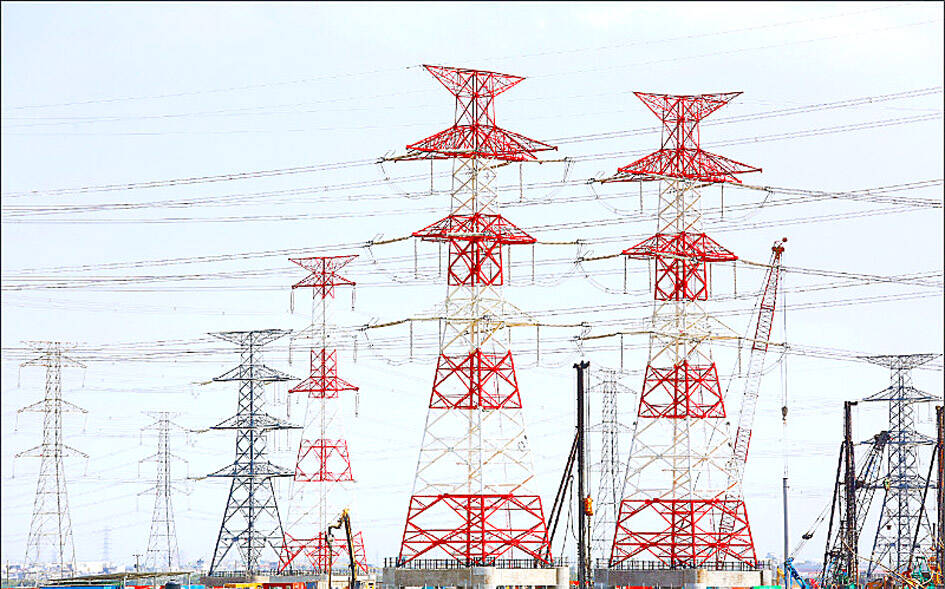Taiwan’s economic activity last month continued to gain support from semiconductor and electronics industries, an electricity consumption survey by the Taiwan Research Institute (台灣綜合研究院) showed yesterday.
The New Taipei City-based institute said in a report that the Electricity Prosperity Index (EPI) it compiled rose 1.27 percent last month from a year earlier, with overall electricity consumption signaling a “yellow-red” light for the third consecutive month.
“Electricity consumption continued to show disparities across industries last month,” the institute said. “As the artificial intelligence [AI] boom continues, demand for high-performance computing, cloud services, and information and communications technology is still thriving, bolstering the semiconductor and electronics industries.”

Photo: Chen Cheng-liang, Taipei Times
“However, traditional industries have seen a continuous decline in electricity demand and a sluggish outlook, affected by weak global end-market demand and the impact of US tariffs,” it said.
Taiwan’s economy continues to show strong momentum, driven by the steady growth of electricity consumption in the semiconductor and electronics industries, and strong export orders, the institute said.
As a result, the economy likely expanded 4.1 percent year-on-year last month and 3.8 percent in the third quarter, it said.
The institute uses the EPI to gauge the health of the nation’s manufacturing and service sectors.
Last month, overall use of high-voltage power increased 2.11 percent year-on-year, with demand from the manufacturing sector rising 1.97 percent, while service sector demand grew 2.25 percent, it said.
Power consumption by semiconductor firms last month rose 8.47 percent from a year earlier, with the EPI’s electricity activity index for the industry showing a booming “red” light for the sixth straight month, the institute said.
Suppliers of computers, electronics and optical products saw an 8.04 percent increase in electricity consumption, along with a “red” light, it said.
However, the electricity demand in the traditional industries continues a downward trend, as non-tech product suppliers are still facing relatively weak momentum, while the challenges of structural transformation persist, it said.
Chemical material producers recorded a 3.59 percent annual decline in power consumption last month due to weak market demand, pricing competition from foreign peers and global overcapacity, the institute said.
Suppliers of steel products were affected by the US tariffs and weak Chinese demand, with their electricity use declining 6.35 percent compared with the same period last year, it said.
Electricity consumption also fell 12.31 percent at textile firms and was down 5.38 percent at machinery equipment producers, it added.
For this quarter, the arrival of the traditional peak season and inventory pileup in supply chains, coupled with the still-strong demand for AI, are expected to continue supporting the growth of the semiconductor and electronics industries, the institute said.
However, the challenges of transformation and upgrading of traditional industries warrant further attention to ensure the nation’s long-term economic growth, it said.

In Italy’s storied gold-making hubs, jewelers are reworking their designs to trim gold content as they race to blunt the effect of record prices and appeal to shoppers watching their budgets. Gold prices hit a record high on Thursday, surging near US$5,600 an ounce, more than double a year ago as geopolitical concerns and jitters over trade pushed investors toward the safe-haven asset. The rally is putting undue pressure on small artisans as they face mounting demands from customers, including international brands, to produce cheaper items, from signature pieces to wedding rings, according to interviews with four independent jewelers in Italy’s main

Japanese Prime Minister Sanae Takaichi has talked up the benefits of a weaker yen in a campaign speech, adopting a tone at odds with her finance ministry, which has refused to rule out any options to counter excessive foreign exchange volatility. Takaichi later softened her stance, saying she did not have a preference for the yen’s direction. “People say the weak yen is bad right now, but for export industries, it’s a major opportunity,” Takaichi said on Saturday at a rally for Liberal Democratic Party candidate Daishiro Yamagiwa in Kanagawa Prefecture ahead of a snap election on Sunday. “Whether it’s selling food or

CONCERNS: Tech companies investing in AI businesses that purchase their products have raised questions among investors that they are artificially propping up demand Nvidia Corp chief executive officer Jensen Huang (黃仁勳) on Saturday said that the company would be participating in OpenAI’s latest funding round, describing it as potentially “the largest investment we’ve ever made.” “We will invest a great deal of money,” Huang told reporters while visiting Taipei. “I believe in OpenAI. The work that they do is incredible. They’re one of the most consequential companies of our time.” Huang did not say exactly how much Nvidia might contribute, but described the investment as “huge.” “Let Sam announce how much he’s going to raise — it’s for him to decide,” Huang said, referring to OpenAI

Nvidia Corp’s negotiations to invest as much as US$100 billion in OpenAI have broken down, the Wall Street Journal (WSJ) reported, exposing a potential rift between two of the most powerful companies in the artificial intelligence (AI) industry. The discussions stalled after some inside Nvidia expressed concerns about the transaction, the WSJ reported, citing unidentified people familiar with the deliberations. OpenAI makes the popular chatbot ChatGPT, while Nvidia dominates the market for AI processors that help develop such software. The companies announced the agreement in September last year, saying at the time that they had signed a letter of intent for a strategic